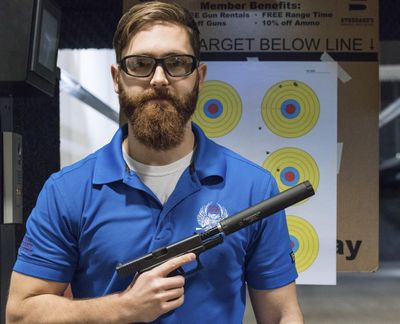‘Silencer’ bill gets mixed reaction from Inland Northwest lawmakers, law enforcement

Rep. Cathy McMorris Rodgers said this week she’s rethinking her support for legislation that would ease some of the regulations on civilians buying noise-canceling devices for guns.
“I have supported that legislation,” McMorris Rodgers said, referring to a law that would lift a $200 tax and other regulations not required of other firearm accessories. “It’s legislation that I need to take another look at it, in light of some of the recent situations.”
The measure, similar to one introduced in the U.S. Senate by Sen. Mike Crapo, R-Idaho, is included in a larger legislative package that could soon come to the floor of the House of Representatives for a vote. The proposal gained prominence earlier this week when Hillary Clinton tweeted following the mass shooting in Las Vegas, “Imagine the deaths if the shooter had a silencer, which the NRA wants to make easier to get.”
The fact-checking website PolitiFact deemed Clinton’s claim “False,” noting the height of the shooter above the Las Vegas strip and the crowded area into which he was firing.
The law, initially introduced by Crapo in January, would undo a regulatory scheme for suppressors originally established in the 1930s. The senator argues the law would help sportsmen and those who live near shooting ranges avoid hearing damage caused by gun blasts.
In a statement issued by his office this week following criticism of the measure, Crapo said suppressors available on the market wouldn’t completely silence the sound of a gunshot.
“It is important to be accurate and note that a suppressor, often mistakenly referred to as a ‘silencer,’ will not completely silence a gunshot as is often portrayed in movies and the media,” Crapo said in the statement.
The legislation has been opposed by law enforcement groups and gun control advocates, who say the regulatory schemes in place have kept suppressors from being used by criminals for more violent crimes.
“I think there’s a feeling that that’s going in the wrong direction in the wake of Las Vegas,” said Kristen Rand, legislative director for the Violence Policy Center, a Washington D.C.-based think tank promoting gun control.
The National Law Enforcement Partnership to Prevent Gun Violence, a coalition of leadership organizations representing police agencies, also has come out against the bill, arguing that it opens the secondary sale of silencers to the same background check loophole that currently exists for guns.
“This will flood the underground market for silencers whose distribution has heretofore been limited by the requirements of (federal law),” the group wrote in a statement issued in March.
The leaders of the region’s two largest law enforcement agencies said they hadn’t reviewed the federal legislation. Sheriff Ozzie Knezovich said the need for a background check to buy a suppressor should be retained in any change to the law.
“Right now in order for someone to get a suppressor, you have to put in the paperwork, and get a background check,” Knezovich said. “I don’t see why we’d want to change that aspect.”
Washington state law requires a background check, even for private sales. But other states have less restrictive laws.
Police Chief Craig Meidl, whose agency is set to receive suppressors on their service rifles, said the difference in sound was negligible with the devices and he didn’t have strong feelings about the proposed changes.
“Having heard the difference between a firearm that has a suppressor, and one that does not, I will tell you it is not a great concern of mine if the community decided to allow that,” Meidl said.